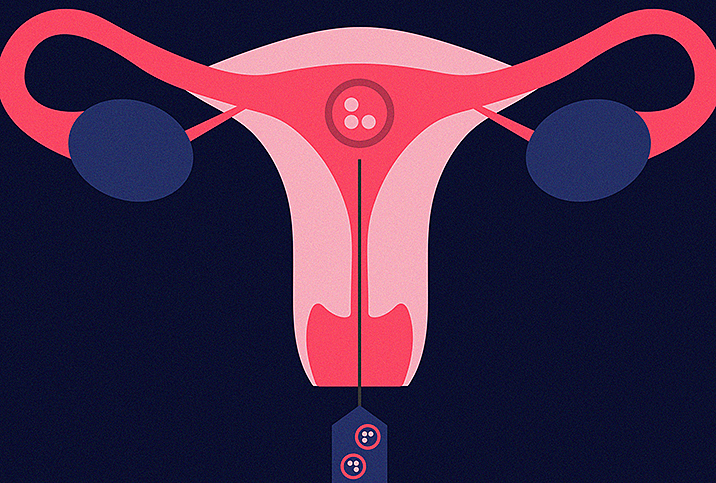When It's Time to See a Fertility Counselor

The trials and realities of infertility can leave you feeling confused, isolated and depressed, especially when it feels like "everyone else" can start a family without much effort. And while the technical definition of infertility is having unprotected sex for 12 months without conceiving, it's not unusual to start feeling anxious and concerned about your chances if three, four or five months of "trying" still fails to result in a positive pregnancy test. That said, the truth is you're not alone, and there are resources to help you navigate this confusing time.
If you're starting to feel worried about your fertility, or even if you just want to talk about future family planning, you might want to consider seeking out a fertility counselor.
Infertility is more common than you might think
Most people don't make a broad announcement to the world when they decide to start trying to get pregnant. Fielding the constant barrage of questions about whether a bun is in the oven is reason enough to keep that information to yourself until there is, in fact, a bun in the oven. But the downside to this desire for privacy is after months of trying without success, you may start to feel isolated in your infertility fears.
Cleopatra Kamperveen, Ph.D., the founder and chief scientific officer of The Fertility & Pregnancy Institute—who goes by Dr. Cleopatra—told us very few people worldwide are truly sterile or infertile, but the numbers are growing. "In the last four to six decades, we have seen marked declines in both female and male fertility. Some scientists report that a woman in her 20s today is likely to be less fertile than her grandmother was at 35," she said. "And, shockingly, these declines in fertility have been even more significant in younger age groups (teens and 20s) than in 'older' age groups (30s and 40s)."
Dr. Cleopatra added it's not just the act of getting pregnant that can be challenging and emotionally gut-wrenching, but staying pregnant, too. "There are almost 4 million babies born each year in the United States alone, but approximately 1 in 4 pregnancies ends in miscarriage. That means there are over 1 million miscarriages each year, just in the U.S."
The stats on both accounts are startling, and underscore the reality that lots of women (and men, too—infertility affects couples, not just women) are struggling with starting or expanding their families. If you're not comfortable talking about your situation with family or friends, a fertility counselor might be the sounding board you need to help you navigate this challenging time.
You don't need to wait 6 to 12 months to talk to a counselor
Many doctors and infertility specialists suggest you put in at least 6 to 12 months of trying before seeking additional help. The six-month guideline typically refers to women 35 and older, who may be experiencing age-related declines in fertility, while the 12-month guideline is the standard advice for women 35 and younger.
But the guidelines, according to Dr. Cleopatra, are a little misguided. "A 2013 human reproduction study showed that nearly 70 percent of women or couples get pregnant within three months when actively trying," she explained. "Between months 4 and 12, only another 24 percent (or approximately 1 in 5) will get pregnant. This data suggests that there is a 'four-month rule' when it comes to conceiving, such that reaching the fourth month of trying to conceive is a critical tipping point for women or couples who are hoping to become pregnant."
The thing is, if your doctor wants you to keep trying for longer before seeking help from a fertility clinic, you don't need to do so passively. If you're nervous about your situation, if you're feeling isolated or depressed, or if you simply want to kickstart the process of figuring out the "next best steps" if pregnancy continues to elude you, this is the perfect time to enlist the help of a fertility counselor.
The role of a fertility counselor
"A fertility counselor is someone that can provide psychotherapy and help a woman or a couple navigate through their concerns or struggles," said Monica Grover, D.O., M.S., a double board-certified gynecologist at VSPOT Sexual Health Spa. "Many feel anxious or depressed during their journey in trying to conceive, or have a preoccupation with it that can become unhealthy. A fertility counselor will help to develop healthy coping mechanisms."
It's also important to note that months of unsuccessful trying can take a toll on a relationship. A counselor can help couples work through the fears and uncertainties together, and help them come up with a plan for supporting one another.
'One of the main reasons a woman may have trouble conceiving is the stress in itself of constantly trying.'
One thing that might come as a surprise to many women trying to get pregnant is how emotionally taxing it can be. "One of the main reasons a woman may have trouble conceiving is the stress in itself of constantly trying. Psychotherapy can help with this as well," said Grover. But she wants to be clear—a fertility counselor is a counselor. They can't help a woman become fertile or perform any medical procedures. But talking through the situation and coming up with healthy coping mechanisms may get you to a place, emotionally, where your body is more ready to conceive.
And, of course, it's important to recognize the role of a counselor isn't just in the pre-conception phase; if you've experienced miscarriages or the loss of a baby, a counselor can help you navigate the feelings surrounding the loss and any concerns you may have about trying again.
When you should seek help
Whether you're in your 20s and trying to figure out if you should freeze your eggs for future family planning or you're in your 40s and after two months of trying, you're starting to feel anxious you might have missed your window to start a family—you may benefit from seeking counseling.
Grover suggests you consider enlisting a fertility counselor if you find that you're "struggling or confused with conception," adding that it's especially important when you find your emotions are harder to manage. "When you start to feel depressed, angry, anxious, sad or confused, or if your relationship with your partner is starting to be compromised as well," she noted.
It's important to remember there's no shame in struggling to start a family, and there's no shame in seeking out help when you need it. The field of fertility counseling is there because it's a real and important service that thousands of women and families need. Just be sure to find a counselor whose expertise is specific to the field. Ask your doctor for a referral or search for a professional in your area at ReproductiveFacts.org.



















